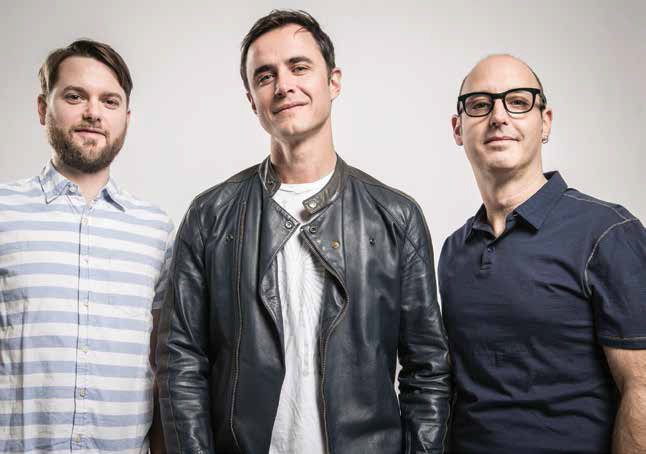The Core: The New Deal

Accessing New Deal Memories
Dan: After my [electro-pop band] Dragonette came off a two-and-a-half-year tour, I, like a true junkie, began to jones for getting back on the road. At the same time, Jamie and I started working together on a soundtrack for a film a friend was making. It’s more ambient than typical New Deal stuff, but it still comes from the same two guys and was reminiscent of the music that we made with The New Deal—minus the giant beats and giant crowd. Around that time, Daft Punk’s Random Access Memories came out and I forwarded Jamie the link right away. It was a signal that the electronic world was stepping back from full-on EDM and remembering that disco was effectively the origin of dance music. That was the world The New Deal naturally inhabited— playing live with this electronic sensibility.
The Newer Deal
Jamie: We’ll play this summer and fall. The intention is not to come back and play for five months and go away, but the intention is also not to come back and go on the road for 150 shows. That was not the final contributing factor to taking a break, but with the amount of shows we were doing—the kind of shows and touring we were doing—it became work, and The New Deal shouldn’t be work. We have the easiest ticket in the world—I’m playing music with guys I really like.
We were doing pretty well, and we got paid sort of decently, but it felt like work traveling all the time and being away from my family. We had to eliminate that from the mix for a while. It wasn’t really fair to lay everything in suspension just because we wanted to stop. It’s not fair to the crew or the other guys in the band if they don’t want to stop. We played our last show in January 2012, but we started wrapping things up in 2011, so it’ll be a good three years. We brought it up with [original drummer] Darren Shearer, and he was not particularly receptive to it. He was not against it, but he couldn’t make it work. We tried for six months with his schedule, and it just wasn’t happening.
Dan: Darren moved to LA and started a pretty serious job [in the film and music world]. He was promoted to the head of his department just when I started thinking about doing this again. So, on two levels, it wasn’t a good time. Because of his schedule, he wasn’t able to commit and he also put a period on being a touring musician when the last New Deal show happened. He said, “That part of my life is over. I’m moving on.” Jamie and I struggled with the rhetorical question, “Is it The New Deal without Darren?”
Speaking in Similar Tongues
Joel: I went to see The New Deal when they started in Toronto in the ‘90s and was hooked. I saw them a lot. Several years later, I was hanging out at a Leslie Feist show and ran into Dan, who I had been introduced to a couple times but never really talked to. We chatted, and he mentioned that he and his wife were working on a new project and looking for a drummer. I said, “Well, I’m a drummer,” and he said, “OK, come by Tuesday.” That’s how Dragonette started. I actually ended up playing a couple shows with The New Deal when Darren had broken his wrist. Fast- forward to a few months ago: Dragonette is in the studio making a record but not really playing any shows. Darren had been reluctant to sign on to some gigs, and Dan just approached me and said, “Hey, would you be available if Darren can’t do these shows?” And I said, “Absolutely! My schedule’s the same as yours.”
Dan: The irony is that when I met Joel, he was in jazz bands and cover bands. Then, he played in Holy Fuck who were a rock-electro version of The New Deal in terms of their improvisational approach and the way they played shows. When I started playing with Joel in Dragonette, it was the first time that either of us had ever worked on pop music. Both of us were just making it up as we went along. So the place Joel and I have spent most of our time working together is in the pop arena, but we meet each other musically on the improvisational side. That’s where we both grew up—making wacky music, not pop music. In a way, we’re finally speaking our mother tongue with each other.
Techno-Boners
Jamie: From our first rehearsal, there’s been a development of our sound on two levels: There’s the sound, and then, there’s the soul of The New Deal, the developments of the pieces that we play. Dan’s bringing a whole new set of bass sounds onstage—I call it a techno-boner. I am bringing four of my five keyboards and then, I am going to utilize one new one. While rehearsing yesterday, we played two sets of music and we didn’t play anything old. It was monstrous. There are recognizable things about The New Deal that people enjoy, and we’ll relearn them. I said to Dan: “Let’s learn 20 New Deal tracks, but only eight that we played regularly. The other 12 should come from spots on our records that we never played. And then, let’s only play two of each a night.” We’re certainly confident in our ability to make up stuff.



















